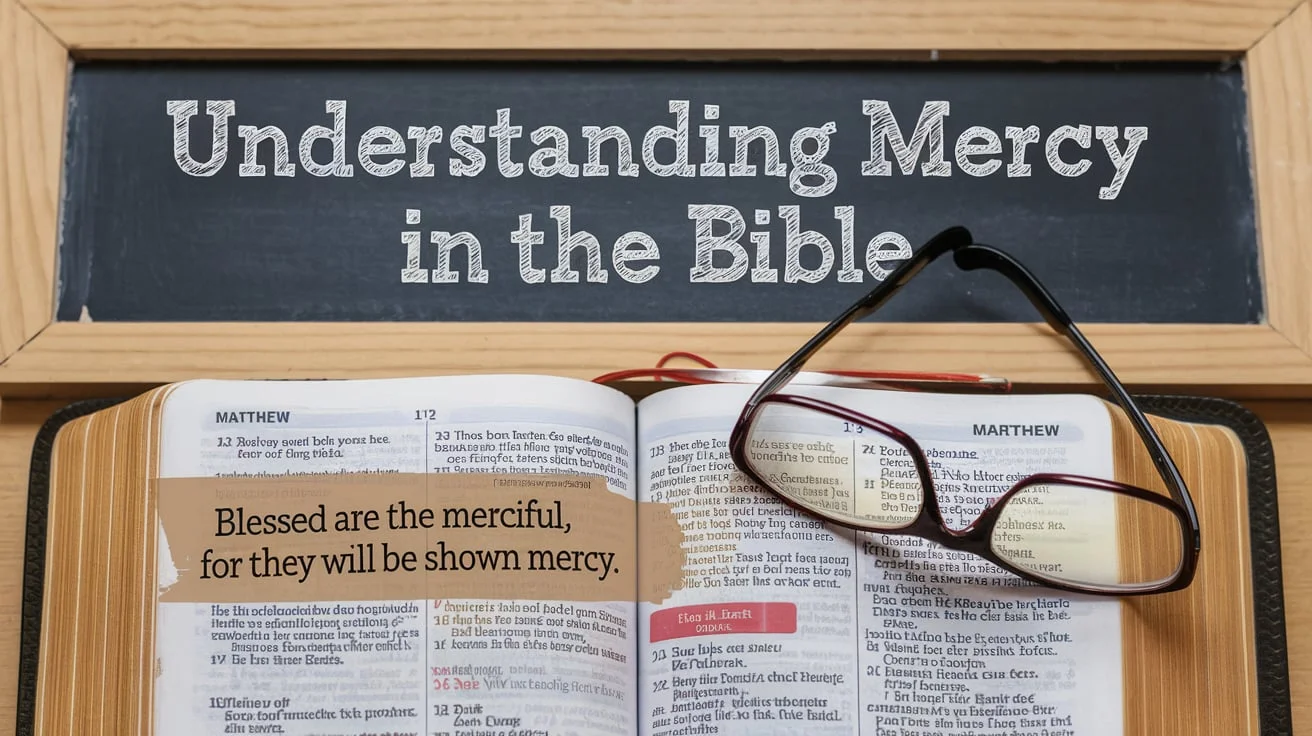Last Updated on November 3, 2024 by Ethan Richards
Mercy is one of the most powerful and profound concepts in the Bible, yet it can be difficult to fully grasp. For Christians, understanding mercy goes far beyond simply knowing its definition.
It involves seeing how God’s mercy shapes His relationship with humanity and how we, as followers of Christ, are called to live out mercy in our daily lives.
In this article, we explore the profound concept of mercy as depicted in the Bible, revealing how God’s compassion and forgiveness offer hope and healing to humanity.
Through biblical narratives and teachings, we uncover the transformative power of mercy in our lives. Join us as we delve into the depths of divine love and its impact on our spiritual journey.
In this post, we will explore the definition of mercy in the Bible, its relationship to compassion, and how mercy is expressed both by God and in human actions. We will also offer practical insights into how you can live out mercy and reflect God’s character.
The Biblical Definition of Mercy

Mercy in the Bible is often understood as “undeserved compassion” or “forgiveness extended to those who deserve punishment.” It is central to the character of God and an essential aspect of the Christian faith.
Etymology and Context
The word for mercy in the Old Testament is the Hebrew word “chesed”, which encompasses mercy, loving-kindness, loyalty, and faithfulness. It’s often used to describe God’s covenant love toward His people. In the New Testament, the Greek word for mercy is “eleos”, which refers to compassion and pity, particularly toward those in distress.
In both the Old and New Testaments, mercy is closely tied to grace, forgiveness, and compassion. These concepts help paint a fuller picture of mercy as a profound act of kindness and love, offered especially when it is least deserved.
Biblical References to Mercy
Here are key scriptures that define mercy in the Bible:
- Matthew 5:7: “Blessed are the merciful, for they will be shown mercy.”
- Micah 6:8: “He has shown you, O mortal, what is good. And what does the Lord require of you? To act justly and to love mercy and to walk humbly with your God.”
- Psalm 103:8: “The Lord is compassionate and gracious, slow to anger, abounding in love.”
Contrasting Mercy and Justice
While justice deals with giving people what they deserve, mercy is about withholding deserved punishment and offering kindness instead. God’s mercy complements His justice. Mercy doesn’t negate justice, but rather, it demonstrates God’s heart of compassion, offering forgiveness and restoration even when justice demands punishment.
Mercy and Compassion: A Symbiotic Relationship
Compassion and mercy often go hand in hand in the Bible. Compassion refers to a deep awareness of and desire to alleviate someone’s suffering, while mercy is the action that flows from this compassion.
Jesus as the Ultimate Example
In the New Testament, Jesus is the perfect model of compassion leading to mercy. Throughout the Gospels, Jesus is moved with compassion when He encounters suffering, whether it’s healing the sick, feeding the hungry, or raising the dead. His compassion always results in merciful actions.
Consider these examples:
- The feeding of the 5,000 (Mark 6:34-44): Jesus saw the crowd and had compassion on them, which led Him to feed them.
- The healing of the leper (Mark 1:40-45): Jesus, filled with compassion, reached out and healed the man who was shunned by society.
Old and New Testament Parallels
The connection between mercy and compassion isn’t unique to the New Testament. In the Old Testament, God’s compassion often leads Him to extend mercy.
Isaiah 54:10
illustrates this: “Though the mountains be shaken and the hills be removed, yet my unfailing love for you will not be shaken nor my covenant of peace be removed,” says the Lord, who has compassion on you.”
Expressions of Mercy in the Bible
Mercy isn’t just an abstract concept; it’s vividly expressed through actions in the Bible. From parables to real-life events, the Bible showcases how mercy is lived out.
Mercy in Action
One of the clearest examples of mercy is the Parable of the Good Samaritan (Luke 10:25-37). In this story, a man is beaten and left for dead on the side of the road.
Several religious figures pass by without helping, but a Samaritan—considered an outcast by Jewish standards—stops to show mercy. The Samaritan bandages the man’s wounds, takes him to an inn, and pays for his care.
This parable teaches us that mercy is not about religious status or duty but about compassionate action toward those in need.
The Role of Forgiveness in Mercy
Mercy is often associated with forgiveness. One powerful example is found in the story of the Prodigal Son (Luke 15:11-32). The son squanders his inheritance on reckless living but returns home, seeking his father’s forgiveness.
Instead of punishing his son, the father runs to embrace him, showing mercy and restoring him to his family.
Mercy in Social Justice
Mercy is also expressed through acts of justice. In the Bible, mercy is linked to caring for the marginalized, such as the poor, widows, orphans, and strangers.
Isaiah 1:17
commands, “Learn to do good; seek justice, correct oppression; bring justice to the fatherless, plead the widow’s cause.” This call to social justice is rooted in God’s merciful nature.
| Example of Mercy in Action | Description |
| Good Samaritan | Compassionate action toward a stranger in need. |
| Prodigal Son | Forgiveness and restoration of a repentant son. |
| Feeding of the 5,000 | Meeting physical needs out of compassion. |
Living Out Mercy: Biblical Examples and Practical Applications
Mercy isn’t just a lofty theological concept; it’s meant to be practiced. The Bible offers numerous examples of mercy in action, and it calls us to follow suit.
Mercy in Daily Life
Mercy can be extended in everyday interactions. Whether through patience with others, showing kindness, or offering forgiveness, we are called to live mercifully. Consider these practical examples:
- Forgiving those who hurt you: Just as God forgives us, we are called to forgive others (Colossians 3:13).
- Helping those in need: Be generous to the poor and help the vulnerable (Proverbs 19:17).
- Speaking kindly: Words have power; choose to speak with kindness and mercy rather than harshness (Ephesians 4:29).
Mercy Toward the Vulnerable
The Bible emphasizes the need for mercy toward those who are most vulnerable. James 1:27 reminds us that true religion is to care for orphans and widows in their distress.
Mercy extends beyond kind thoughts; it requires action to alleviate suffering and restore dignity.
Balancing Mercy and Accountability
Mercy does not mean turning a blind eye to sin or wrongdoing. There is a balance between being merciful and holding others accountable.
Galatians 6:1
teaches that we should restore those who have fallen in a spirit of gentleness, but also with wisdom and caution.
Mercy as a Core Attribute of God
God’s mercy is a defining attribute of His character. Throughout Scripture, we see God’s mercy manifesting in His dealings with humanity.
God’s Mercy Described in Scripture
Consider these powerful descriptions of God’s mercy:
- Psalm 103:8-12: “The Lord is compassionate and gracious, slow to anger, abounding in love… He does not treat us as our sins deserve or repay us according to our iniquities.”
- Exodus 34:6-7: When God reveals Himself to Moses, He describes Himself as “The Lord, the compassionate and gracious God, slow to anger, abounding in love and faithfulness, maintaining love to thousands, and forgiving wickedness, rebellion, and sin.”
God’s mercy is a testament to His covenantal faithfulness. Even when humanity fails, God remains merciful, upholding His promises and offering forgiveness to those who repent.
Mercy in Redemption
God’s ultimate act of mercy is seen in Jesus Christ. Through His death and resurrection, Jesus paid the price for humanity’s sins, offering mercy and salvation to all who believe. Romans 5:8 encapsulates this beautifully:
“But God demonstrates his own love for us in this: While we were still sinners, Christ died for us.”
God’s Mercy and Forgiveness

Forgiveness is the most visible expression of God’s mercy. From the Old Testament to the New Testament, God continually extends forgiveness to those who repent.
God’s Compassionate Forgiveness
Consider the story of David and Bathsheba (2 Samuel 11-12). After committing adultery and murder, David seeks God’s forgiveness.
Psalm 51
is his heartfelt prayer for mercy: “Have mercy on me, O God, according to your unfailing love; according to your great compassion blot out my transgressions.” God forgives David, demonstrating that no sin is too great for His mercy.
Jesus’ Teachings on Forgiveness
Jesus repeatedly taught on the importance of mercy in forgiveness. In Matthew 18:21-35, He tells the parable of the unforgiving servant, who, despite being forgiven a massive debt, refuses to forgive a fellow servant a smaller amount.
This parable drives home the point that mercy and forgiveness go hand in hand—we are called to forgive as we have been forgiven.
Mercy vs. Judgment
James 2:13 teaches us that “mercy triumphs over judgment.” While judgment brings punishment, mercy brings forgiveness and restoration. This doesn’t mean judgment is negated; instead, it shows that God prioritizes mercy when there is repentance.
Mercy in God’s Promises and Faithfulness
God’s mercy is not a one-time act; it is ongoing, extending throughout history and into eternity. His mercy is tied to His promises and faithfulness.
Mercy in the Old Covenant
In the Old Testament, God repeatedly extends mercy to Israel despite their disobedience. Lamentations 3:22-23 reminds us that “because of the Lord’s great love, we are not consumed, for his compassions never fail. They are new every morning; great is your faithfulness.”
The New Covenant and God’s Continued Mercy
In the New Covenant, God’s mercy continues through Jesus Christ. Titus 3:5 explains that “He saved us, not because of righteous things we had done, but because of His mercy.”
This ongoing mercy is not earned but is a gift of God’s grace, available to all who come to Him in faith.
Faithfulness in Trials
Even in trials, God’s mercy is evident. Consider Job’s story—though he endured immense suffering, God’s mercy was ultimately revealed in the restoration of his life. James 5:11 reflects this: “
You have heard of Job’s perseverance and have seen what the Lord finally brought about. The Lord is full of compassion and mercy.”
Experiencing Mercy Through God’s Love
God’s love is the foundation of His mercy. Without His love, there would be no mercy.
Salvation as the Ultimate Act of Mercy
Salvation is the clearest demonstration of God’s love and mercy. As Ephesians 2:4-5 states, “But because of his great love for us, God, who is rich in mercy, made us alive with Christ even when we were dead in transgressions—it is by grace you have been saved.”
Mercy in Grace
Grace and mercy are closely related. While grace gives us what we don’t deserve (favor and blessing), mercy withholds what we do deserve (punishment). Together, they reflect the full measure of God’s love toward us.
The Transformative Power of Mercy
Experiencing God’s mercy has a transformative effect on believers. It not only saves us but also sanctifies us, changing our hearts and minds to be more like Christ. Mercy shapes how we treat others, extending kindness, compassion, and forgiveness.
Living Out God’s Mercy in Everyday Life

We are called to reflect God’s mercy in our daily lives, not just in big acts of charity but in everyday interactions.
Practical Mercy in Relationships
Mercy can transform relationships. Here are some ways to practice mercy in your interactions:
- Be patient with others, recognizing that everyone has struggles.
- Extend forgiveness even when it’s difficult.
- Show kindness in your words and actions.
Mercy in Leadership and Authority
Those in positions of authority are called to lead with mercy. This applies not only to church leaders but also to parents, employers, and anyone in a position of influence. Micah 6:8 reminds us to act justly, love mercy, and walk humbly with God.
Community and Global Outreach
Mercy extends beyond personal relationships to community care and global outreach. Many Christian organizations live out God’s mercy by providing food, shelter, healthcare, and education to those in need.
| Examples of Christian Outreach | Description |
| World Vision | Providing clean water and education. |
| Compassion International | Sponsoring children in poverty. |
| Samaritan’s Purse | Offering disaster relief worldwide. |
The Overflowing Mercy of God: A Call to Action
God’s mercy is abundant and overflowing. It’s not something we should keep to ourselves but something to share with the world.
Reflecting God’s Mercy
As recipients of God’s mercy, we are called to reflect it in our actions. Just as God has been merciful to us, we are to show mercy to others, offering forgiveness, kindness, and compassion.
Practical Ways to Show Mercy
Here are some actionable steps to live out mercy in your life:
- Volunteer at a local charity or food bank.
- Forgive someone who has wronged you.
- Support organizations that work to alleviate poverty and suffering.
Quotes and Prayers on Mercy
End with these inspiring quotes and prayers centered on mercy:
- Psalm 145:8-9: “The Lord is gracious and full of compassion, slow to anger and great in mercy. The Lord is good to all, and His tender mercies are over all His works.”
- Prayer for Mercy: “Lord, help me to be merciful as You are merciful. May Your love fill my heart and guide me in showing kindness and compassion to others, just as You have shown to me.”
FAQs
1. What is the definition of mercy in the Bible?
Mercy in the Bible refers to God’s compassion and kindness toward humanity, particularly in the context of forgiveness and grace.
It is the quality of showing compassion to those in distress and is central to God’s character, exemplifying His willingness to forgive sins and offer salvation.
2. How does the Bible illustrate God’s mercy?
The Bible illustrates God’s mercy through various stories and teachings. Key examples include the parable of the Good Samaritan, which highlights the importance of showing mercy to others, and the story of the prodigal son, which showcases God’s forgiving nature. These narratives emphasize that mercy is an active response to human need.
3. What are some biblical verses that emphasize mercy?
Several verses underscore the theme of mercy, such as Psalm 103:8, which states, “The Lord is merciful and gracious, slow to anger, and abounding in steadfast love.”
Additionally, Lamentations 3:22-23 affirms that “the steadfast love of the Lord never ceases; his mercies never come to an end.” These scriptures illustrate the unending nature of God’s mercy.
4. How can understanding mercy lead to personal transformation?
Understanding God’s mercy can lead to profound personal transformation. It encourages individuals to practice forgiveness and compassion in their own lives, fostering healthier relationships and a more gracious perspective.
This understanding can also provide comfort during difficult times, knowing that they are recipients of divine mercy.
5. What role does mercy play in Christian life and practice?
Mercy plays a vital role in Christian life as it reflects the heart of the Gospel. Christians are called to embody mercy through acts of kindness, forgiveness, and service to others.
By practicing mercy, believers not only mirror God’s character but also promote a community rooted in love and compassion.
Conclusion
Mercy is a core aspect of God’s nature and a vital practice in the Christian life. Whether through forgiveness, helping those in need, or simply showing kindness, we are called to live out mercy every day.
Let the mercy God has shown you overflow into your relationships, your community, and the world. By doing so, you will not only reflect God’s character but also draw closer to Him as you live a life marked by love, compassion, and grace.

James Wilson is a renowned biblical scholar and dream expert, dedicated to exploring the spiritual dimensions of dreams. His in-depth knowledge and compassionate approach provide readers with valuable tools to understand and embrace the divine messages revealed in their dreams.










